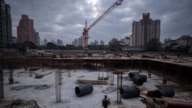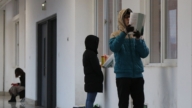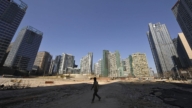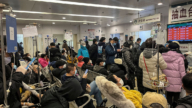【新唐人2012年8月15日讯】大陆劳动密集产业聚集的闽三角——厦门、泉州等地区,包括运动鞋、男装、雨伞业等轻工业出现了停工潮。据大陆媒体报导,由于“无钱可挣”,大批工厂出现“不忙生产忙(出)租房的窘境”。而专家和企业主都认为,这在中国是一个普遍现象。
大陆沿海地区除珠三角、长三角经济区之外,就属闽三角地区是轻工业工厂的集中地。有大陆媒体最近实地查访厦门、泉州等地发现,当地工业园区出现“不忙生产忙(出)租房”现象。曾经火热的招工广告,被厂房出租所取代。
报导说,当地“1栋5层厂房只剩数十员工”的情况比比皆是。由于“无钱可挣”企业主争相出租厂房。有老板抱怨“贷款利息加上增值税和地方税费”,毛利只剩10%,上亿销售额最后利润只剩一两百万元人民币,若倒楣碰上客户倒账就整年白干,不如出租厂房“轻松赚”。有相当一部分中小企业主对“做工厂”的远景,信心产生动摇,出现“收摊子”心态。
经常往返于沿海地区的贸易商王先生向《新唐人》介绍,由于出口产业萧条,厂房的出租率和租金也像溜滑梯一样下滑。过去小型一千多平方米的厂房年租金几十万,可能还找不到。而报导说,目前厦门工业区一平方米租金8到12元人民币。
大陆贸易商王先生:“现在去租厂房很多呀,价格差不多缩水了百分之七、八十,很便宜现在。基本上情况都差不多,能够出租的工厂状况还算可以,很多就直接卖掉、直接倒闭掉了。”
受订单萎缩影响,轻工业如服装、鞋子、雨伞等产业冲击最大,主要因素是利润太低。
王先生:“第一个,直接倒闭掉了,为了还债就把工厂卖掉,或者,卖不掉就先租出去。第二种就是工厂的规模缩小,很多的厂房腾出来没用,有些就直接租出去。还有一些干脆就转型了,空心化了,直接把资金腾出来。”
报导还说,现在国家宣导企业转型升级,但要落实于基层谈何容易。而王先生分析,在大陆,民营企业受制于资金、技术和管理,要转型是不可能的事。
王先生:“民营企业去银行贷款很难的,而且银行的利率很高。如果投入资金搞技术升级去转型,那利润回报很低的,因为你没有一个专利保护。第三个,我们华人的管理制度跟欧美差距很大的。少数几家龙头企业可能有这个实力转型,民办的实业基本上就是,一直坚持到撑不下去为止再关门。很少能够出现转型,很难的。”
美国“南卡罗莱纳大学艾肯商学院”教授谢田分析,投资获利出现窘迫的状况,是中国整体经济形势放缓,进入停滞现象的反映。
美“南卡罗莱纳大学艾肯商学院”教授谢田:“这我想不只是在厦门这些地区,也是珠三角、长三角的问题。现在这实际上已经是一个全中国普遍的现象。最近中国报告出来的经济增长数字,甚至被美国《华尔街日报》质疑,还有其他西方媒体感到非常吃惊,就是再没办法相信中国的数据了。”
谢田指出,中共当局由于经济陷于停滞,处于“滞胀”状态;在严峻的经济状况之下,只能延续过去的一贯作法,在数字上搞欺骗。他说,目前,中国经济与国际经济形势同样处于危机状态,厦门、泉州等地的中小企业受到挫折,也就并非不寻常了。
采访编辑/梁欣 后制/李月
Fujian Manufacturers Hit Hard
Southern Fujian industrial area goes through critical times.
Light industries like, clothing and shoes, are hit the worst.
According to Mainland media reports, the manufacturing
is down and industries are renting their factory buildings.
However, experts and entrepreneurs believe
this is a common phenomenon throughout China.
Besides the Pearl River Delta and Yangtze River Delta, most
of light industry labor is concentrated in the Fujian triangle.
Recently, some Mainland media carried out onsite
investigation in Xiamen and Quanzhou.
They discovered the phenomenon of factories renting out
buildings and easing on industrial production.
The once popular “help wanted” advertisements
have been replaced by “buildings for rent.”
Reports say it is common to see a five floor building
left with only a few dozen employees.
Since there is no money to earn,
industry owners compete to rent the buildings out.
Some owners complain that after interest, local taxes
and value-added tax, only 10% of gross profit is left.
Only 1 or 2 million RMB is left
from several hundred million RMB worth of sales.
If they are unlucky and encounter a client with bad debts,
an entire year of their work is wasted.
Thus they think it is better
to rent and earn some easy money.
A considerable amount of medium and small size business
owners waver in their confidence in starting a business.
They feel it is time to “wrap it up.”
Merchant Mr. Wang, who often travels between China’s
south coastal industry areas, was interviewed by NTDTV.
He said, due to export’s bleak state, the rate which factory
buildings are rented out and the rent are sliding down.
In the past, it was hard to find a small factory place
for several dozen thousands of RMB.
But now, one square meter rents
for only 8-12 RMB in Xiamen.
Mr. Wang (Merchant): “Now there are many factory spaces
for rent, the price shrank by about 70 to 80 percent.
It is very cheap now.
Basically they are all around this price.
The factories that are able to rent out are still alright,
but a lot of [owners] just sell or close down their factories.”
Due to a decrease in purchasing orders, light industries like
those for apparels, shoes and umbrellas are worst affected.
The main reason is profits are too low.
Mr. Wang: “The first option is to close down or sell in order
to pay back debts. If they are unable to sell, they rent.
The second is to downsize the factory,
a lot of rooms which are not used get rented out.
Some just transformed and directly freed up their fund.”
Reports say, China promotes corporate restructuring and
upgrading, but it is not easy to apply it at a grass root level.
Mr. Wang analyzes, private enterprises have limited funds,
technology and management, it is very hard to restructure.
Mr. Wang: “It is hard for private enterprises to get loans
from banks, and interest rates are very high.
If investing in the technical aspects and restructure that way,
profits are very low as you are not protected by a patent.
Another problem is Chinese people’s management is very
bad compared to Americans’ and Europeans’ management.
Maybe a few leading enterprises have the actual capability
to restructure, but private enterprises basically hold on until they can, then they shut down.
Very few restructurings have taken place.
It is very hard.”
Professor Xie Tian at the University of South Carolina
Aiken School of Business analyzes the situation.
He thinks, the issue of investment earnings is a reflection
of China’s economic slowdown and entering stagnation.
Xie Tian: “I think this is not only a problem in Xiamen area,
but also in the Pearl River Delta and Yangtze River Delta.
In reality, this is already a common phenomenon
all over China now.
Recently the numbers from China economic reports
were questioned by the Wall Street Journal.
Other western medias felt very shocked too,
they cannot believe China’s statistics anymore.”
Xie Tian points out due to economic stagnation and a state
of stagflation, there is only one thing CCP can do.
Under such a grim economic condition it can carry on
with its ‘good old’ practice – to misrepresent the numbers.
He said, similar to the global economic situation,
China’s economic situation is in a risky state too.
It is not unusual for the medium and small size enterprises
in Xiamen and Quanzhou to experience such setbacks.






























